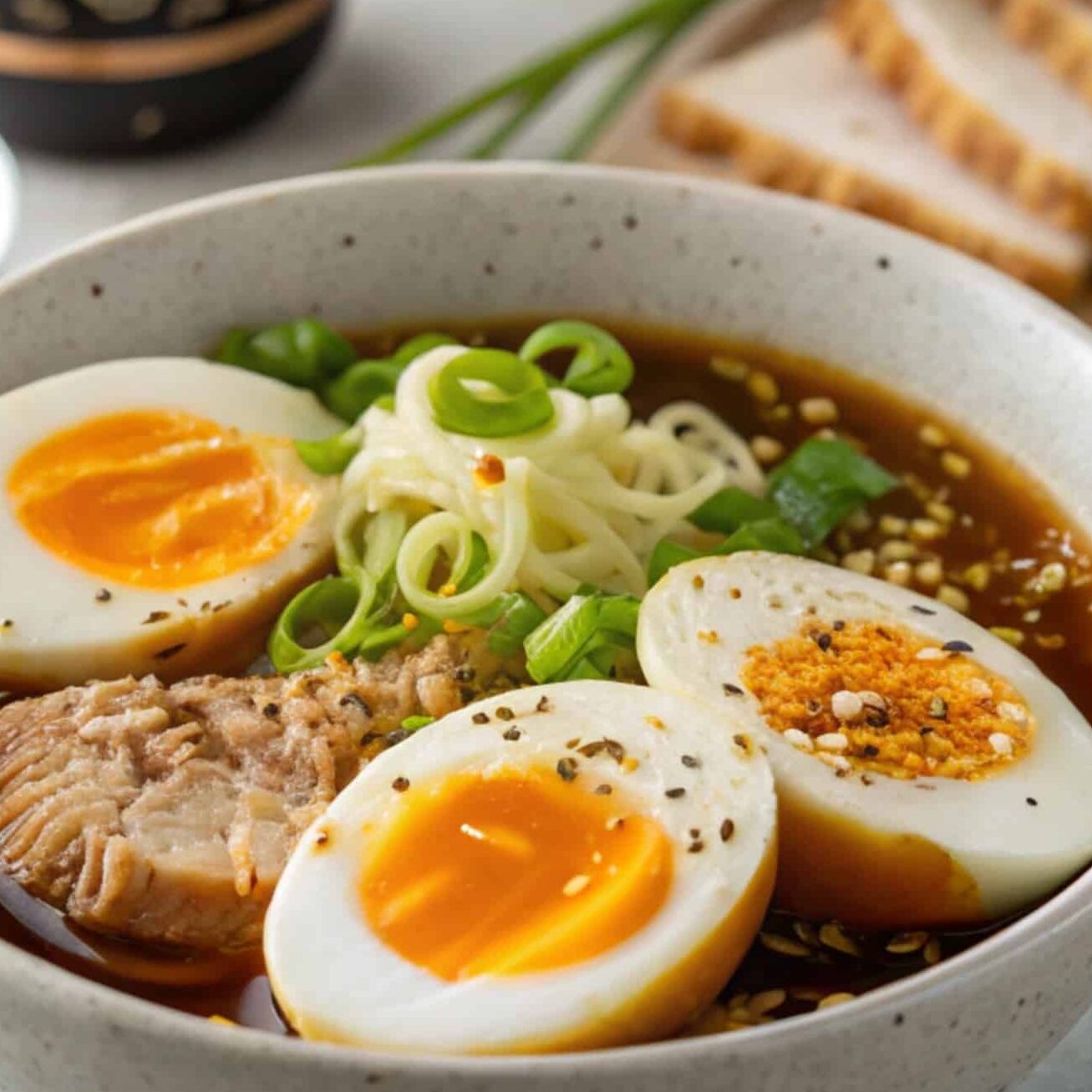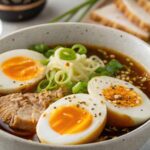
Why Make This Recipe
Ramen eggs, or Ajitama, are a delightful addition to any bowl of ramen. They bring a rich, savory flavor that perfectly complements the soup and noodles. Making these flavorful eggs is not only simple but also adds a hint of gourmet touch to your dish. The soft-boiled eggs soak in a delicious soy marinade, making every bite a treat. Plus, they can be enjoyed in many ways served alongside meals, as a snack, or even on salads!
How to Make Ramen Eggs
Ingredients
- 6 large eggs (*see note)
- Vinegar (optional for boiling eggs)
- ½ cup soy sauce (light sodium)
- ¼ cup water
- ¼ cup mirin
- 2 tablespoons granulated sugar
Directions
Boil the eggs: Start by bringing a pot of water to a boil. Gently add the eggs to the boiling water. Boil for 6 minutes to achieve that perfect soft-boiled texture. If you want, you can add vinegar to the water to help with peeling later. Use about 2 tablespoons of vinegar for 5 to 6 cups of water.
Shock the eggs: After 6 minutes, take the eggs from the hot water and transfer them to an ice water bath. This cools them down quickly and stops any further cooking. Leave them in the ice water for about 15 minutes to make peeling easier.
Make the marinade: While the eggs are cooling, prepare the marinade. In a bowl or container, mix together the soy sauce, water, mirin, and sugar. Stir until the sugar fully dissolves. If you’re using a bowl, transfer the marinade to your marinating container.
Marinate the eggs: Once cooled, crack and peel the eggs. Rinse them to remove any small shell pieces. Place the peeled eggs into the prepared marinade. Let them soak for at least 8 hours, but overnight is best. If the eggs are not fully submerged, remember to turn them occasionally.
Enjoy: These ramen eggs are perfect for adding to ramen, serving as a side, or enjoying as a snack. If you have leftover eggs, take them out of the marinade after 12 to 36 hours, depending on how flavorful you want them.
How to Serve Ramen Eggs
You can serve ramen eggs in various ways. They are traditionally placed in ramen bowls, but they can also be enjoyed as a stand-alone snack or paired with rice dishes and salads. Consider garnishing them with sliced green onions or sesame seeds for a pop of flavor and color.
How to Store Ramen Eggs
To store ramen eggs, keep them in the marinade in an airtight container. They can last in the refrigerator for about 2 to 3 days. After this period, it’s best to remove them from the marinade to prevent them from becoming too salty.
Tips to Make Ramen Eggs
- Aim to use fresh eggs for the best taste and texture.
- If you prefer firmer yolks, increase the boiling time to 7-8 minutes.
- Experiment with different marinades by adding garlic, ginger, or even chili flakes for a unique twist!
- Make sure to check the eggs during marination and rotate them for an even flavor.
Variation
You can customize ramen eggs by adjusting the marinade ingredients. For a sweet touch, add some honey instead of sugar. If you like a bit of heat, include a splash of sriracha or chili oil to the marinade.
FAQs
What is the best way to peel ramen eggs?
The best way to peel ramen eggs is to cool them quickly in an ice bath after boiling. This helps separate the egg from the shell. If the eggs are difficult to peel, try rolling them gently on the counter before peeling to crack the shell.
Can I use different types of soy sauce for ramen eggs?
Yes, you can use different types of soy sauce. Light sodium soy sauce is recommended to balance the flavor without making it too salty. You can also try using dark soy sauce for a richer taste but remember to adjust the marinating time.
How long should I marinate the ramen eggs?
Marinate the ramen eggs for at least 8 hours for a good flavor. However, for the best taste, leaving them overnight is ideal. If you prefer a stronger taste, keep them in the marinade for up to 36 hours.
Can I use this recipe for hard-boiled eggs?
Yes, you can use this recipe for hard-boiled eggs. Simply increase the boiling time to about 10-12 minutes. The marinade adds a great flavor, no matter the egg’s doneness.
Conclusion
Give these ramen eggs a try; they can truly elevate your ramen experience! They burst with flavor and are versatile enough to complement many dishes. Family members will surely love this tasty addition, and your taste buds will thank you! For more delicious ideas, remember to check out my Pinterest and Medium page for inspiration.
Print
Ramen Eggs
- Total Time: 8 hours 30 minutes
- Yield: 6 eggs 1x
Description
Ramen Eggs, or Ajitama, are flavorful soy-marinated soft-boiled eggs that add richness and umami to any bowl of ramen. Simple to make and incredibly versatile, they’re delicious as a topping, snack, or side dish.
Ingredients
- 6 large eggs
- Vinegar (optional for boiling eggs)
- ½ cup soy sauce (light sodium)
- ¼ cup water
- ¼ cup mirin
- 2 tablespoons granulated sugar
Instructions
- Bring a pot of water to a boil and gently add the eggs. Boil for 6 minutes for soft-boiled texture. Add 2 tablespoons of vinegar to the water if desired to help with peeling.
- Transfer the eggs immediately to an ice bath to cool for 15 minutes to stop the cooking process and make peeling easier.
- Mix soy sauce, water, mirin, and sugar in a bowl until sugar dissolves completely to create the marinade.
- Peel the cooled eggs and rinse to remove any shell fragments. Place them in the marinade, ensuring they are well coated.
- Marinate for at least 8 hours or overnight for deeper flavor. If not fully submerged, rotate occasionally for even marination.
- Remove eggs after 12–36 hours depending on flavor preference. Serve sliced in ramen, with rice, or as a snack.
Notes
Store ramen eggs in their marinade in an airtight container for up to 3 days. Use fresh eggs for best texture and flavor. Adjust boiling time for firmer yolks or experiment with flavors like garlic, ginger, or chili flakes in the marinade.
- Prep Time: 10 minutes
- Cook Time: 6 minutes
- Category: Side Dish
- Method: Boiled and Marinated
- Cuisine: Japanese
Nutrition
- Serving Size: 1 egg
- Calories: 90
- Sugar: 3g
- Sodium: 480mg
- Fat: 6g
- Saturated Fat: 2g
- Unsaturated Fat: 3g
- Trans Fat: 0g
- Carbohydrates: 4g
- Fiber: 0g
- Protein: 6g
- Cholesterol: 185mg

